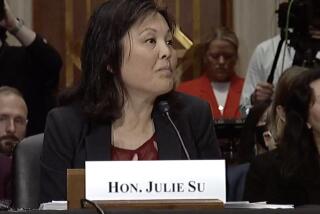Claims of Ailing Nuclear Workers Are Hot Potatoes
- Share via
WASHINGTON — Labor Secretary Elaine Chao has asked the White House to shift responsibility for a new program to compensate sick nuclear workers from her agency to the Justice Department, eliciting a bipartisan round of criticism from lawmakers who say the move could badly delay disbursement of the funds.
In her March 9 letter to the White House, Chao said the Labor Department doesn’t have the infrastructure to administer the Energy Employees Occupational Illness Compensation Program, passed last year by Congress with an initial appropriation of $60.4 million. Justice should run it because the department already makes payments to uranium miners and people living downwind from nuclear test sites, she said.
But members from both parties argued this week that they intended for Labor to run the program because it has administered similar workers’ compensation programs for nearly a century, including the Longshore and Harbor Workers Act and the Coal Miners Black Lung Disease Act.
“I think the inevitable result will be that victims will have a significant delay in receiving compensation,” said Rep. Ted Strickland (D-Ohio), whose district includes many who could be aided by the program.
“And some of these people, quite frankly, are in the process of dying.”
On Wednesday he sent to the White House a letter signed by eight other members, both Republicans and Democrats, asking that Labor run the program.
Republican Sens. Mike DeWine and George Voinovich of Ohio sent a similar letter as well.
Congress passed the program, intended to help Cold War-era workers suffering from cancer and other diseases, without specifying which department should run it. But Strickland said members had made their intentions clear.
The Clinton administration in December gave jurisdiction over the program to Labor.
Under the program, workers deemed to have illnesses related to exposure to nuclear weapons material at Energy Department and privately owned facilities would receive payments of $150,000 and full medical coverage for life.
The initial appropriation was $60.4 million, but the program could cost almost $2 billion.
The payments are to begin July 31.
A spokesman said Voinovich spoke with Chao on Wednesday, and members of their staffs would try to iron out their differences within the next few days.
Labor Department spokesman Stuart Roy said there’s room for negotiation but added that nothing has swayed Chao: “It seems fairly straightforward that this is a program that ought to be administered by the Department of Justice.”
Roy said the Labor Department has no capacity for making complicated judgments regarding workers’ claims that exposure to nuclear material caused their illnesses.
Chao, in her letter to White House budget director Mitchell E. Daniels Jr., cautioned that several issues still must be resolved surrounding “dose reconstruction,” the process of determining who is entitled to payments under the program.
“Whichever organization is given primary responsibility for claims processing,” Chao wrote, “the design of the dose reconstruction process will be critical to ensuring that the program is administrable and that it avoids a morass of litigation, uncertainty and frustration.”
The White House declined comment.
More to Read
Sign up for Essential California
The most important California stories and recommendations in your inbox every morning.
You may occasionally receive promotional content from the Los Angeles Times.













